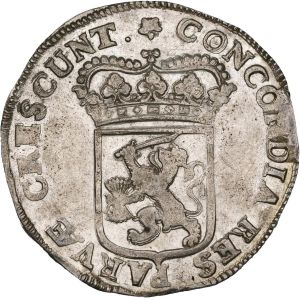Difference between revisions of "Utrecht 1694 silver ducat Dav-4904"
m |
m (Text replacement - " the the " to " the ") |
||
| Line 2: | Line 2: | ||
[[Image:JE162-2034r.jpg|300px|thumb]] | [[Image:JE162-2034r.jpg|300px|thumb]] | ||
| − | This specimen was lot 2034 in Jean Elsen sale 162 (Brussels, June 2025), where it sold for €150 (about US$208 including buyer's fees). The catalog description<sup>[1]</sup> noted, <blockquote>"''NEDERLAND, UTRECHT, Provincie, AR zilveren dukaat, 1694. Vz/ Staande ridder n.r. met zwaard en provinciewapen. Kz/ Gekroond generaliteitswapen. Defekt in de muntplaat aan de rand.'' ([[Netherlands]], [[Netherlands, Utrecht|province of Utrecht]], silver ducat of 1694. Obverse: standing knight with sword supports the provincial arms; reverse: crowned arms of the Generality. Edge defect, Very Fine - Extremely Fine.)"</blockquote> Silver ducats were struck in Utrecht and other Dutch provinces until 1794 and are the most common large Dutch silver coin. Simultaneous with | + | This specimen was lot 2034 in Jean Elsen sale 162 (Brussels, June 2025), where it sold for €150 (about US$208 including buyer's fees). The catalog description<sup>[1]</sup> noted, <blockquote>"''NEDERLAND, UTRECHT, Provincie, AR zilveren dukaat, 1694. Vz/ Staande ridder n.r. met zwaard en provinciewapen. Kz/ Gekroond generaliteitswapen. Defekt in de muntplaat aan de rand.'' ([[Netherlands]], [[Netherlands, Utrecht|province of Utrecht]], silver ducat of 1694. Obverse: standing knight with sword supports the provincial arms; reverse: crowned arms of the Generality. Edge defect, Very Fine - Extremely Fine.)"</blockquote> Silver ducats were struck in Utrecht and other Dutch provinces until 1794 and are the most common large Dutch silver coin. Simultaneous with the silver ducat (48 stuivers) was the "prince" daalder (40 stuivers), Lion daalder (48 stuivers), the three gulden (60 stuivers) and the ducaton (silver rider). The catalog does not explain why so many different large silver coins were felt to be necessary. This subtype without inner circles is listed for 1679-88, 1692-99. |
''Recorded mintage:'' 1,702,895 for 1679-99. | ''Recorded mintage:'' 1,702,895 for 1679-99. | ||
Latest revision as of 13:18, 21 August 2025
This specimen was lot 2034 in Jean Elsen sale 162 (Brussels, June 2025), where it sold for €150 (about US$208 including buyer's fees). The catalog description[1] noted,
"NEDERLAND, UTRECHT, Provincie, AR zilveren dukaat, 1694. Vz/ Staande ridder n.r. met zwaard en provinciewapen. Kz/ Gekroond generaliteitswapen. Defekt in de muntplaat aan de rand. (Netherlands, province of Utrecht, silver ducat of 1694. Obverse: standing knight with sword supports the provincial arms; reverse: crowned arms of the Generality. Edge defect, Very Fine - Extremely Fine.)"
Silver ducats were struck in Utrecht and other Dutch provinces until 1794 and are the most common large Dutch silver coin. Simultaneous with the silver ducat (48 stuivers) was the "prince" daalder (40 stuivers), Lion daalder (48 stuivers), the three gulden (60 stuivers) and the ducaton (silver rider). The catalog does not explain why so many different large silver coins were felt to be necessary. This subtype without inner circles is listed for 1679-88, 1692-99.
Recorded mintage: 1,702,895 for 1679-99.
Specification: 28.25 g, 0.873 fine silver, this specimen 28,18 g.
Catalog reference: KM 65, Dav-4904, Verk. 105, 3; Delm-981.
- Cuhaj, George S., and Thomas Michael, Standard Catalog of World Coins, 1601-1700, 6th ed., Iola, WI: Krause Publications, 2014.
- Davenport, John S., European Crowns, 1600-1700, Galesburg, IL, 1974.
- van der Wis, Jan, and Tom Passon, Catalogus van de Nederlandse Munten geslagen sind bet aantreden van Philips II tot aan het einde van de Bataafse Republiek (1555-1806), 2nd ed., Apeldoorn, Netherlands: Omni-Trading b.v., 2009.
- [1]Elsen, Philippe, et al., Vente Publique 162: Collection Jacques Druart, Brussels: Jean Elsen et ses Fils S.A., 2025.
Link to:

